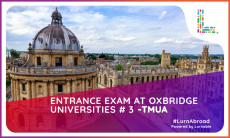The choice of your college major is a tricky one. You may be sure about an academic field while you pick it as an undergraduate, but your perspective may change by the time you complete the degree. Some students find the subjects too hard, while others consider a change because they want to invest in a different career. Fortunately, you can make a switch and pursue your Master’s in a completely different field.
The process is not as challenging as you might imagine, even if you are an international student. Moreover, several institutions facilitate the crossover while maintaining their high enrolment standards. You only need to have the facts right and take the right steps at the right time to do it successfully. Let us explain the steps of making a switch so that you can build the career of your dreams.
CONSIDER THE CROSSOVER RELEVANCE
Not all crossovers are the same, so you need to consider the relevance in your case. Even as you may pursue unrelated Master’s degrees, the process will be simple when the crossover is relevant to your undergraduate program. For example, moving from one science discipline to another will be easier than switching to a journalism programme. If there is a gap between the two disciplines, you must have a strategy to bridge it. But you need not worry because nearly all Master’s programmes take applicants from different fields. As long as you have a degree from an accredited school, there are good chances to get through.
CHECK WITH THE INSTITUTION
Whether you plan to take up a programme in your country or study abroad, you must check the admissions requirements for the Master’s course you are considering. It is best to have a look at the university website, or you may reach out personally. Another alternative is to connect with an admission counsellor to suggest the best path for making the switch.
UNDERSTAND THE REQUIREMENTS
When you check the website, go through the minimum requirements for acquiring admission to the programme of your choice. You may make it without a relevant bachelor’s degree. But the decision depends entirely on the discretion of the admissions officer. Here are the requirements you will have to focus on.
- STANDARDISED TESTS- The Graduate Record Examination (GRE) is the most common standardised test for admission for master’s programmes, though not all of them may require you to take one. If planning to take up an unrelated discipline, you must appear for a relevant test to validate your initiative and knowledge level. For example, you will have to submit your Graduate Management Admission Test (GMAT) scores if you seek admission to a B-school or MBA programme.
- ADMISSION STATEMENT- The admissions statement offers the opportunity to present a valid and convincing reason for your acceptance to a new stream. It is more like selling your interest and conviction, and you can use the chance to showcase the initiatives you may have taken to cover the academic gap.
- CERTIFICATIONS- When it comes to making up for the gaps, you can consider earning a certification to enhance your knowledge of the new discipline. Fortunately, you can explore such certification programmes with massive online open courses (MOOCs).
- PROFESSIONAL EXPERIENCE- You can go the extra mile by earning a minimum level of professional experience in addition to your Bachelor’s degree as some schools and universities may expressly require it. The experience should be relevant to the programme. It is best to check the prerequisites with the individual schools so that you can pursue relevant professional experience to boost your chances of getting through.
ADDITIONAL REQUIREMENTS FOR INTERNATIONAL STUDENTS
If you are an international student seeking admission to a Master’s degree in a different field, you will have to fulfil the basic requirements first. At a minimum, you will need to prove English language proficiency with requisite scores for standardised tests, such as the TOEFL or the IELTS. Accepted tests and minimum scores may vary from school to school, so you can find them from the admission requirements listed on the website.
GEARING UP FOR YOUR MASTER’S PROGRAMME
While preparing for your master’s programme is not mandatory, it is desirable to brush up on the basics because you have missed them out during the undergraduate years. You will understand the areas where you lack by taking a practice GRE test. Preparatory classes will help if you feel that you will be behind your peers who already come with a solid base. In some cases, the university may also assist you with the transition.
Getting admission to a different Master’s stream may take time and effort, but it is not impossible. You can enhance your odds of acceptance by strengthening your application with letters of recommendation, a statement of personal interest, and other documentation. If you genuinely want to follow your heart and find your calling, you can make it to a Master’s programme of your choice and create a dream career.

If you are considering studying abroad why don’t you discuss your prospects and opportunities with experts at Lurnable’s dedicated study abroad counselling division LurnPathways?












